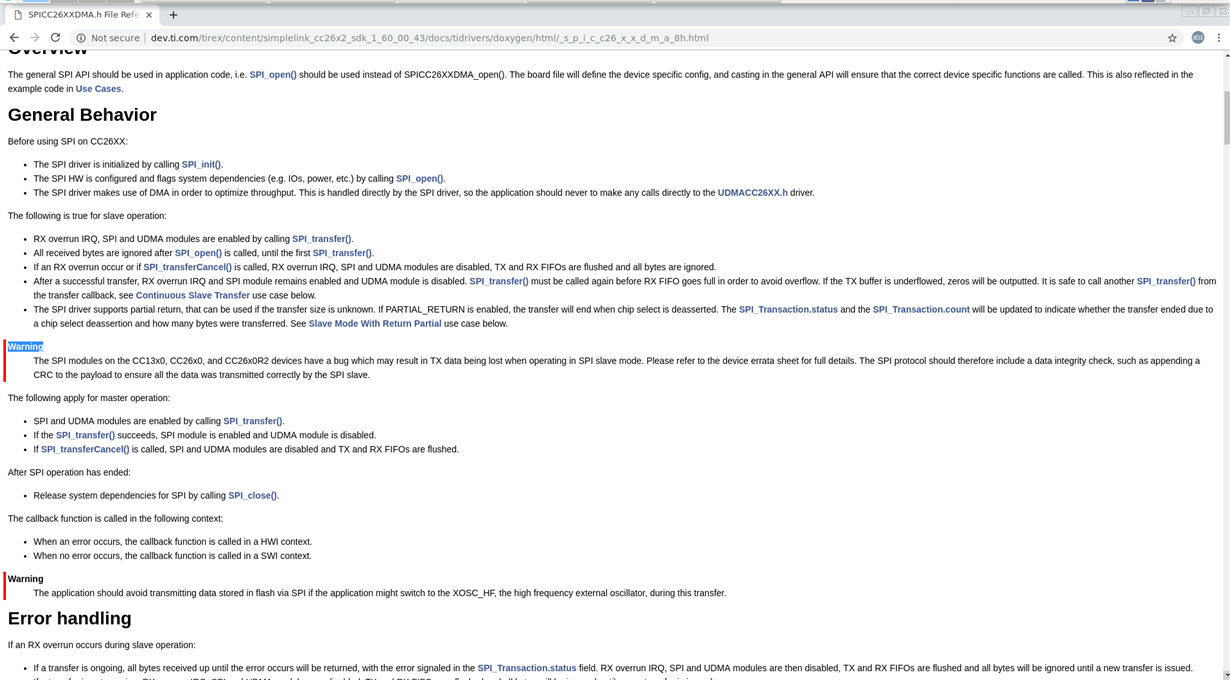Other Parts Discussed in Thread: CC2650,
Hi all,
I have some problem with CC2650 SPI slave mode.
I try to send a 16 bits MISO (SPI clk = 4M, and 16 bits each CS)
It can work well. (the figure below is what I want)
However, the MISO have some unexpected error.
Sometimes, It transmits with a several bis delay or repeat part of the pattern I asked to send. (show in the figure below)
I guess the problem is SPI PIN assignment or the way i used SPI_transfer.
My code is base on example simple_peripheral.
The code below is how I initial and call SPI.
SPI_init();
// init SPI
SPI_Params spi_ask_params;
SPI_Params_init(&spi_ask_params);
spi_ask_params.dataSize = 8;
spi_ask_params.frameFormat = SPI_POL0_PHA1;
spi_ask_params.bitRate = UMC_ASK_FREQ; // 4 Mhz
spi_ask_params.mode = SPI_SLAVE;
spi_ask_params.transferMode = SPI_MODE_CALLBACK; // when call back mode we can understand this mission is done or not
spi_ask_params.transferCallbackFxn = spi_ask_callback;
spi_ask_handle = SPI_open(Board_SPI0, &spi_ask_params);
spi_ask_transaction.count = SPI_BUFFER_SIZE; // 20
spi_ask_transaction.txBuf = spi_txbuf;
spi_ask_transaction.rxBuf = spi_rxbuf;
spi_done = SPI_transfer(spi_ask_handle, &spi_ask_transaction);
The only thing SPI callback function do is reset all the txbuf.
The code below is my PIN assignment.
const PIN_Config BoardGpioInitTable[] = {
Board_RLED | PIN_GPIO_OUTPUT_EN | PIN_GPIO_LOW | PIN_PUSHPULL | PIN_DRVSTR_MAX, /* LED initially off */
Board_GLED | PIN_GPIO_OUTPUT_EN | PIN_GPIO_LOW | PIN_PUSHPULL | PIN_DRVSTR_MAX, /* LED initially off */
Board_BTN1 | PIN_INPUT_EN | PIN_PULLUP | PIN_IRQ_BOTHEDGES | PIN_HYSTERESIS, /* Button is active low */
Board_BTN2 | PIN_INPUT_EN | PIN_PULLUP | PIN_IRQ_BOTHEDGES | PIN_HYSTERESIS, /* Button is active low */
Board_SPI_FLASH_CS | PIN_GPIO_OUTPUT_EN | PIN_GPIO_HIGH | PIN_PUSHPULL | PIN_DRVSTR_MIN, /* External flash chip select */
Board_UART_RX | PIN_INPUT_EN | PIN_PULLDOWN, /* UART RX via debugger back channel */
Board_UART_TX | PIN_GPIO_OUTPUT_EN | PIN_GPIO_HIGH | PIN_PUSHPULL, /* UART TX via debugger back channel */
Board_SPI0_MOSI | PIN_INPUT_EN | PIN_PULLDOWN, /* SPI master out - slave in */
Board_SPI0_MISO | PIN_GPIO_OUTPUT_EN | PIN_GPIO_LOW | PIN_PUSHPULL | PIN_DRVSTR_MAX, /* SPI master in - slave out */
Board_SPI0_CLK | PIN_INPUT_EN | PIN_PULLDOWN, /* SPI clock */
Board_SPI0_CSN | PIN_INPUT_EN | PIN_PULLUP,
/* Board_SPI1_MOSI | PIN_INPUT_EN | PIN_PULLDOWN, SPI master out - slave in */
/* Board_SPI1_MISO | PIN_INPUT_EN | PIN_PULLDOWN, SPI master in - slave out */
/* Board_SPI1_CLK | PIN_INPUT_EN | PIN_PULLDOWN, SPI clock */
/* UMC_reset | PIN_INPUT_EN | PIN_PULLUP, */
PIN_TERMINATE
};
/* SPI Board */ #define Board_SPI0_MISO IOID_8 /* RF1.20 */ #define Board_SPI0_MOSI IOID_9 /* RF1.18 */ #define Board_SPI0_CLK IOID_10 /* RF1.16 */ #define Board_SPI0_CSN IOID_23 // IOID_23 #define Board_SPI1_MISO PIN_UNASSIGNED #define Board_SPI1_MOSI PIN_UNASSIGNED #define Board_SPI1_CLK PIN_UNASSIGNED #define Board_SPI1_CSN PIN_UNASSIGNED
I have tested SPI CS before. (I guessed CC2650 has problem with reading CS)
I changed SPI CS PIN from IOID_23 to PIN_UNASSIGNED, however, nothing change.
Does anyone have any thought or idea?
Thanks.






